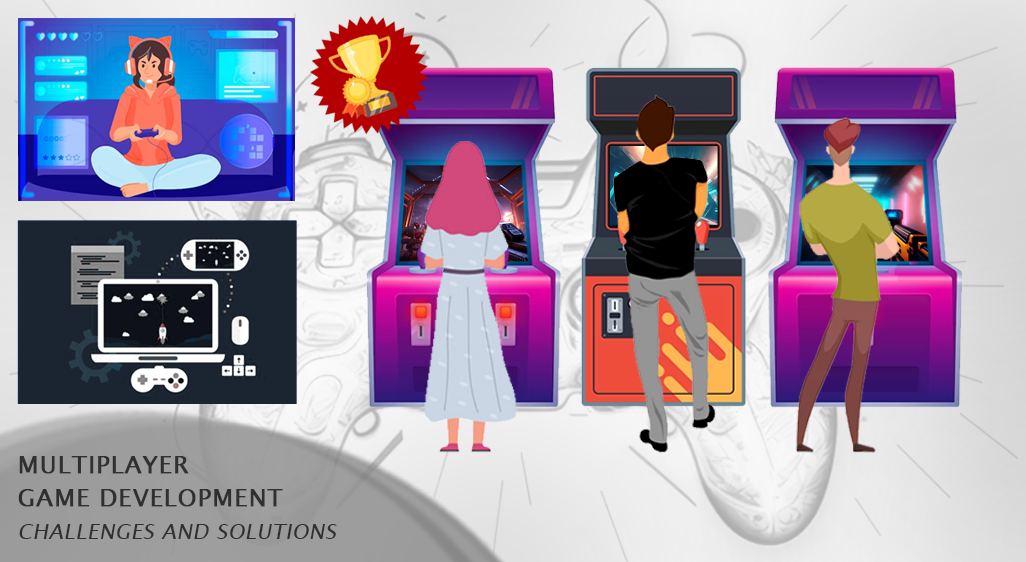Playing games with others has become more and more common in the industry. Many people find gaming to be irresistibly dynamic because it allows them to interact with gamers from all around the world, whether in friendly matches or competitive ones. Undoubtedly, developing multiplayer games is an interesting career path, but it also presents a special set of difficulties and complications.
The field of multiplayer game development will be examined in this blog article, along with the difficulties faced and creative solutions used by developers to provide smooth and entertaining multiplayer experiences for players.
The Rise of Multiplayer Gaming
Multiplayer gaming has evolved significantly over the years. What began as a local split-screen co-op in arcade games has grown into massive online multiplayer worlds that transcend geographical boundaries. This evolution is partly due to technological advancements and increased access to high-speed internet, which has made it easier for gamers to connect and play together.
The appeal of multiplayer games is vast. It fosters social interaction and competition, creating a sense of community among players. Whether you’re teaming up with friends to complete a quest or facing off against rivals in an online arena, multiplayer games offer a diverse range of experiences.
Challenges in Multiplayer Game Development
While the allure of multiplayer gaming is undeniable, it’s essential to understand the challenges associated with developing these games. Here are some of the primary obstacles that game developers encounter:
Synchronization and Latency
In multiplayer games, all players must see and interact with the game world consistently. Achieving synchronization across different devices and networks while minimizing latency (the delay between an action and its effect) is a daunting task. Developers must find solutions to ensure that players experience a seamless and fair game environment.
Scalability
Multiplayer games can range from small-scale matches to massive online worlds with thousands of concurrent players. Creating a system that can scale to accommodate this wide spectrum of players while maintaining stability is challenging. The server infrastructure and netcode must be designed to handle these varying player loads.
Cheating and Security
Cheating can severely disrupt the multiplayer experience. Developers must implement robust security measures to prevent cheating and ensure a level playing field. This includes detecting and preventing hacks, cheats, and exploits.
Data Transfer and Bandwidth
Multiplayer games involve a constant exchange of data between players and the game server. This data transfer relies on network bandwidth. Optimizing this process to minimize the use of bandwidth while ensuring smooth gameplay is crucial.
Game Balancing
Balancing a multiplayer game is an intricate process. Developers must ensure that no single player or strategy dominates the game. Achieving this balance while providing diversity in characters, abilities, or playstyles is a complex challenge.
Innovative Solutions to Multiplayer Challenges
The challenges in multiplayer game development may seem daunting, but game developers have devised innovative solutions to address these issues:
Client-Side Prediction
To combat latency, developers implement client-side prediction. This technique allows players to make actions locally on their devices, such as character movement, while the server later confirms these actions. This makes the game feel responsive and minimizes the impact of latency.
Dedicated Servers
Using dedicated servers allows developers to maintain better control over the multiplayer environment. These servers are hosted in data centers and provide a stable and controlled connection for players. Cloud-based solutions further enhance scalability.
Anti-Cheat Systems
Anti-cheat systems are crucial to maintaining a fair playing field. These systems detect and prevent cheating using a combination of server-side validation, client-side security measures, and data analysis.
Network Compression
Developers employ network compression techniques to reduce the amount of data sent between players and the server. This helps save bandwidth and ensures smoother gameplay.
Iterative Game Balancing
Achieving perfect game balance is an ongoing process. Developers monitor gameplay data, gather player feedback, and release regular updates to tweak character abilities, weapon stats, and other game elements to ensure fairness.
Cross-Platform Play
Enabling cross-platform play has become increasingly important. This allows players on different gaming platforms (such as PCs, consoles, and mobile devices) to interact in the same multiplayer environment. It’s a complex challenge, but it expands the player base and fosters inclusivity.
The Future of Multiplayer Gaming
As technology continues to advance, the future of multiplayer gaming looks promising. Emerging technologies like 5G, cloud gaming, and improved virtual reality experiences are set to revolutionize the way we play together. These innovations will bring new challenges, but they also open the door to exciting possibilities.
In conclusion, multiplayer game development is a complex and dynamic field, characterized by a host of challenges and the need for innovative solutions. Game developers continue to push the boundaries, delivering engaging and seamless multiplayer experiences that captivate gamers worldwide. The future of multiplayer gaming is full of potential, making it an exciting space to watch for both developers and players.
As you delve into the world of multiplayer gaming, remember that the challenges and solutions discussed in this blog are just the tip of the iceberg. Game developers will keep pushing the boundaries, ensuring that the thrill of multiplayer gaming continues to evolve and captivate gamers worldwide. Whether you’re teaming up with friends to complete a quest or facing off against rivals in an online arena, multiplayer games offer a diverse range of experiences.
In the end, it’s the collective experience of sharing adventures, competing, and connecting with other players that makes multiplayer gaming truly special. The challenges and innovations in multiplayer game development keep the industry vibrant and full of potential, ensuring that multiplayer gaming remains a source of excitement and joy for years to come.












